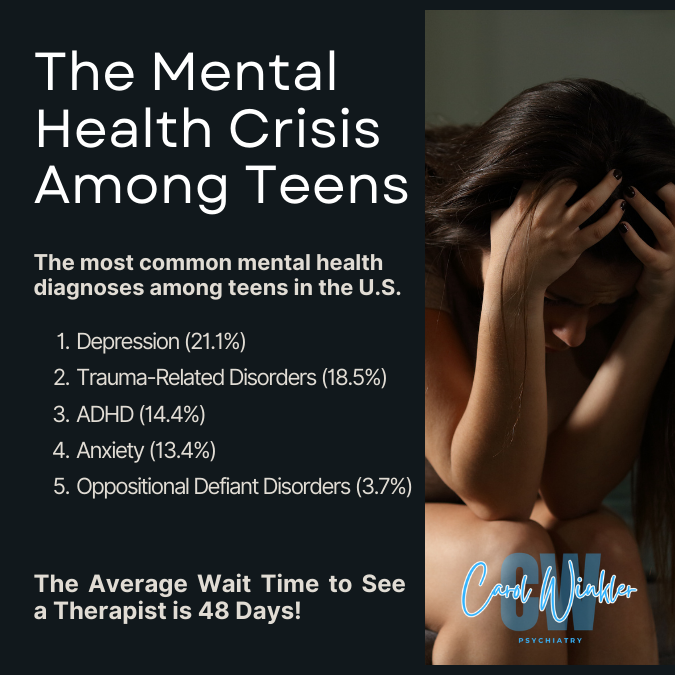 The Mental Health Crisis Among Teens: A Call for Action
The Mental Health Crisis Among Teens: A Call for Action
In January 2024, the world witnessed a poignant moment when Elmo, the beloved “Sesame Street” puppet, prompted a mental health check-in on social media, asking, “How is everybody doing?” Thousands of people earnestly responded, highlighting the growing awareness of mental health issues, particularly among young people.
However, this call for mental health awareness comes at a time when the harmful effects of social media on children are under scrutiny. In a Senate Judiciary Committee hearing, Republican Sen. Lindsey Graham accused Meta CEO Mark Zuckerberg and other social media CEOs of having “blood on [their] hands” for a “product that’s killing people.” Zuckerberg acknowledged the tragic consequences of social media use, particularly among teens, stating, “It’s terrible. No one should have to go through the things that your families have suffered.”
Internal research by Meta in March 2020 revealed that Instagram use increased rates of anxiety and depression in some teens, with 32% of teen girls reporting that Instagram made them feel worse about their body image. This is particularly concerning given that a significant share of teens (35%) use social media “almost constantly,” according to Pew data collected in late 2023.
The University of California-San Francisco found that the prevalence of conduct disorder among children rose by 62% for each hour of social media use. Additionally, a staggering 63% of 12- to 17-year-olds used TikTok weekly as of November 2021, according to Forrester Research.
Sandstone Care analyzed data from the Substance Abuse and Mental Health Services Administration (SAMHSA) to identify the most common mental health diagnoses among teens in the U.S. in 2021. The top five diagnoses were:
- Depression (21.1% of all diagnoses)
- Trauma-related disorders (18.5%)
- ADHD (14.4%)
- Anxiety (13.4%)
- Oppositional defiant disorders (3.7%)
These diagnoses highlight the complex and multifaceted nature of mental health issues among teens. Depression, in particular, has seen a significant increase over the past five years, with 199,160 teens diagnosed in 2021, representing a 1.7 percentage point increase from the previous five years.
Trauma-related disorders, which include post-traumatic stress disorder (PTSD), reactive attachment disorder, and acute stress disorder, have also seen a rise, with 174,121 teens diagnosed in 2021, representing a 2.5 percentage point increase from the previous five years.
ADHD, a chronic brain condition that affects attention, hyperactivity, and impulsivity, has remained prevalent, with 135,601 teens diagnosed in 2021, representing a 1.5 percentage point decrease from the previous five years.
Anxiety, characterized by intense pressure and worry, has also seen an increase, with 126,693 teens diagnosed in 2021, representing a 4.5 percentage point increase from the previous five years.
Oppositional defiant disorders, which involve angry or irritable behavior, have seen a decrease, with 34,798 teens diagnosed in 2021, representing a 2.1 percentage point decrease from the previous five years.
These statistics underscore the urgent need for action to address the mental health crisis among teens. While celebrities like Selena Gomez, Simone Biles, and Billie Eilish have helped reduce the stigma of mental health conditions, more needs to be done to provide access to timely and effective mental health services.
The average wait time to see a therapist is 48 days, according to the National Council for Mental Wellbeing, and this wait time is often longer for children. Additionally, diagnostic testing for mental health conditions can be complex and imprecise, making it difficult for teens to receive accurate diagnoses and appropriate treatment.
In conclusion, the mental health crisis among teens is a pressing issue that requires urgent attention. While there has been progress in reducing the stigma of mental health conditions, more needs to be done to provide access to timely and effective mental health services. Although finding timely access to a child psychiatrist can take weeks or sometimes months, Carol Winkler Psychiatry is here to help NOW. Call 716-906-4210 to check availability and schedule an initial assessment.

Comments are closed